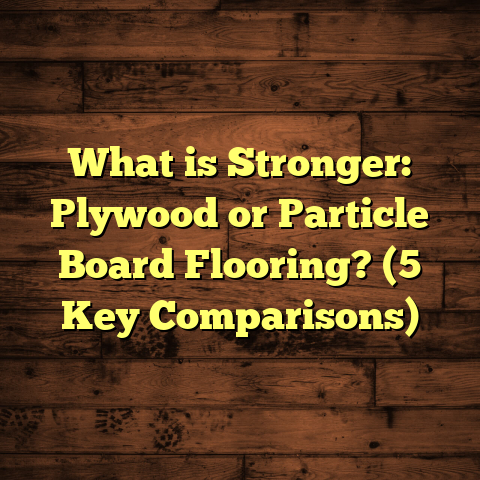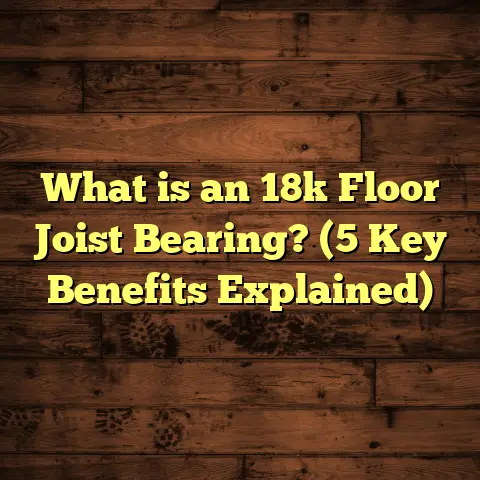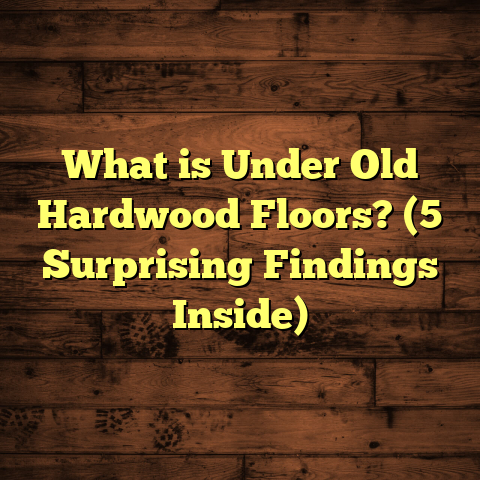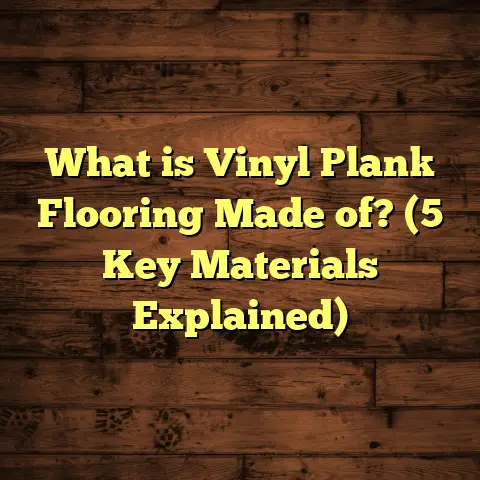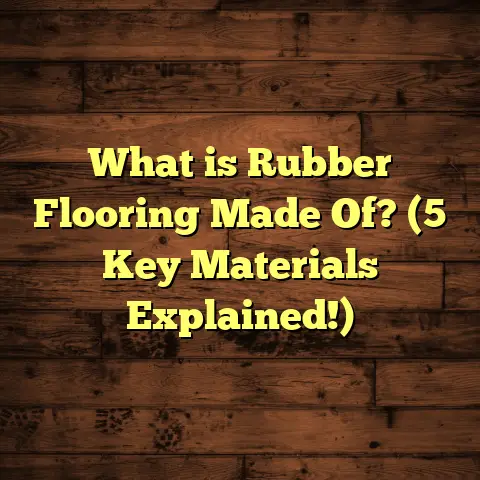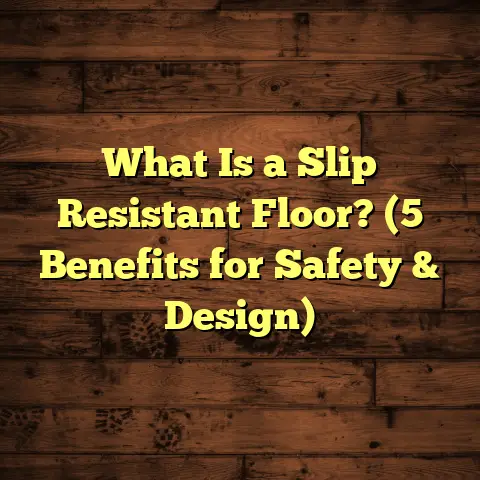What is Engineered PVC Vinyl Flooring? (5 Benefits You Can’t Ignore)
Allergies have always been a big deal for me. I used to think sneezing and itchy eyes were just part of life until I started paying attention to my home environment. Turns out, what’s under your feet can seriously impact your health. Dust mites, mold, and chemical residues lurking in flooring materials can trigger reactions and make living spaces uncomfortable. If you or someone you care about battles allergies or asthma, you probably already know how important it is to pick the right flooring.
That’s why I want to talk about engineered PVC vinyl flooring. Over the years, working as a flooring contractor and homeowner myself, I’ve seen this type of flooring become a top choice for many who want a floor that’s not only stylish but also durable, moisture-resistant, and allergy-friendly. Let me walk you through what this flooring is, why it’s special, and what benefits it brings to the table.
What Is Engineered PVC Vinyl Flooring?
Let me start by explaining exactly what engineered PVC vinyl flooring means because it’s easy to get confused with all the flooring options out there.
Engineered PVC vinyl flooring is a type of resilient flooring made mainly from polyvinyl chloride (PVC), which is a synthetic plastic polymer. But unlike traditional vinyl floors that are often a single sheet or simple tile, engineered vinyl consists of several layers bonded together for enhanced strength and performance.
Here’s the typical structure of engineered PVC vinyl flooring:
- PVC Core Layer: This is the heart of the product. It’s a dense, solid core made from PVC material that gives the floor its stability and durability. The core is often designed to resist dents and impacts while being flexible enough to handle temperature changes.
- Wear Layer: On top of the core lies a transparent wear layer. This layer protects against scratches, scuffs, stains, and UV damage. It acts like armor for the floor surface.
- Decorative Layer: Just below the wear layer is a high-resolution printed decorative film. This layer gives the floor its look—whether that’s wood grain texture, stone patterns, or colorful designs.
- Backing Layer: The bottom backing adds support and sometimes cushioning or sound absorption. Some engineered vinyl floors have attached underlayments for comfort.
The “engineered” part means it’s constructed in layers to combine the best properties of different materials into one product. This layered design makes it stronger and more stable than traditional vinyl floors or laminate options.
How Is Engineered PVC Vinyl Flooring Different From Other Vinyl Floors?
You might wonder how this differs from sheet vinyl or luxury vinyl tiles (LVT). The difference mainly comes down to construction quality and installation methods.
- Sheet Vinyl: Usually comes in large, flexible rolls that are glued down. They’re less durable and more prone to tearing or bubbling.
- Luxury Vinyl Tiles (LVT): These are vinyl tiles that mimic hardwood or stone but often have thinner cores.
- Engineered PVC Vinyl: Has a rigid core with multiple layers pressed together for extra strength. Many engineered vinyl products use click-lock systems that snap together for floating installations without glue.
This means engineered PVC vinyl floors are better at handling heavy traffic, moisture, and temperature shifts without warping or damage.
Why I Started Recommending Engineered PVC Vinyl Flooring
In my early years as a flooring contractor, I mostly installed hardwood and laminate floors because that’s what most clients wanted. But I noticed something interesting—more people were asking about floors that could stand up to pets, kids, spills, and yes, allergies.
I started getting requests for moisture-resistant options for basements and bathrooms too. That pushed me to research more about resilient flooring types. After testing various products on my own projects and seeing how clients reacted months later, engineered PVC vinyl kept standing out.
For example, I installed engineered vinyl in a friend’s home who had two dogs and a toddler. Other flooring options showed wear quickly when pets scratched or when juice spilled on the floor. But the vinyl stayed intact without stains or dents after a year.
Plus, my sister has severe dust allergies, so when she redid her living room with engineered PVC vinyl flooring, her symptoms improved noticeably. That was enough proof for me that this product wasn’t just hype—it was genuinely effective for everyday needs.
5 Benefits You Can’t Ignore About Engineered PVC Vinyl Flooring
Now let me get to the good stuff—the reasons why engineered PVC vinyl flooring deserves a spot on your home improvement list.
1. Allergy-Friendly and Healthy Indoor Air Quality
This is probably the biggest reason I talk about engineered PVC vinyl with allergy sufferers.
Carpet is notorious for trapping allergens like dust mites, pet dander, pollen, and mold spores deep inside fibers. Vacuuming helps but never removes everything. Over time, these allergens build up and can seriously worsen symptoms for people with asthma or allergies.
Engineered PVC vinyl floors are completely non-porous surfaces. They don’t trap anything inside because they’re smooth and easy to clean. A quick sweep or mop removes dust and allergens efficiently.
I found research from the American College of Allergy, Asthma & Immunology that shows homes with hard surface floors have up to 50% fewer allergens indoors than carpeted homes. This reduction translates into fewer asthma attacks and allergy flare-ups.
Beyond dust mites, some flooring materials release volatile organic compounds (VOCs)—chemicals that can irritate respiratory systems. Many modern engineered PVC vinyl products are low-VOC certified or meet strict indoor air quality standards like FloorScore® or GREENGUARD®. That means they emit fewer harmful chemicals into your home air.
One of my clients was struggling with constant allergy issues despite regular cleaning. When she replaced her old carpet with engineered vinyl planks certified for low VOC emissions, her indoor air quality improved based on professional testing we arranged. She told me she finally felt she could breathe easier at home.
2. Water and Moisture Resistance — Perfect for Wet Areas
If you’ve ever had water damage on your floors, you know how frustrating it can be to fix warped wood or bubbled laminate.
Engineered PVC vinyl flooring is essentially waterproof due to its PVC core and sealed edges. It doesn’t absorb water like hardwood does, nor does it swell or peel under moisture stress.
That makes it an ideal choice not only for kitchens and bathrooms but also basements or laundry rooms where humidity levels can be high.
I remember helping install this floor in a home where the basement flooded after heavy rainstorms. While other parts of the house suffered from mold and warping issues afterward, the basement floor made of engineered PVC vinyl dried out with no visible damage or discoloration.
According to data from the National Floor Safety Institute, water-related flooring failures cause thousands of dollars in repairs each year. Using moisture-resistant materials like engineered vinyl can saveYour request failed. Please try again.
